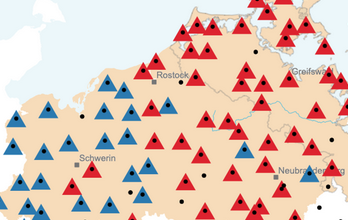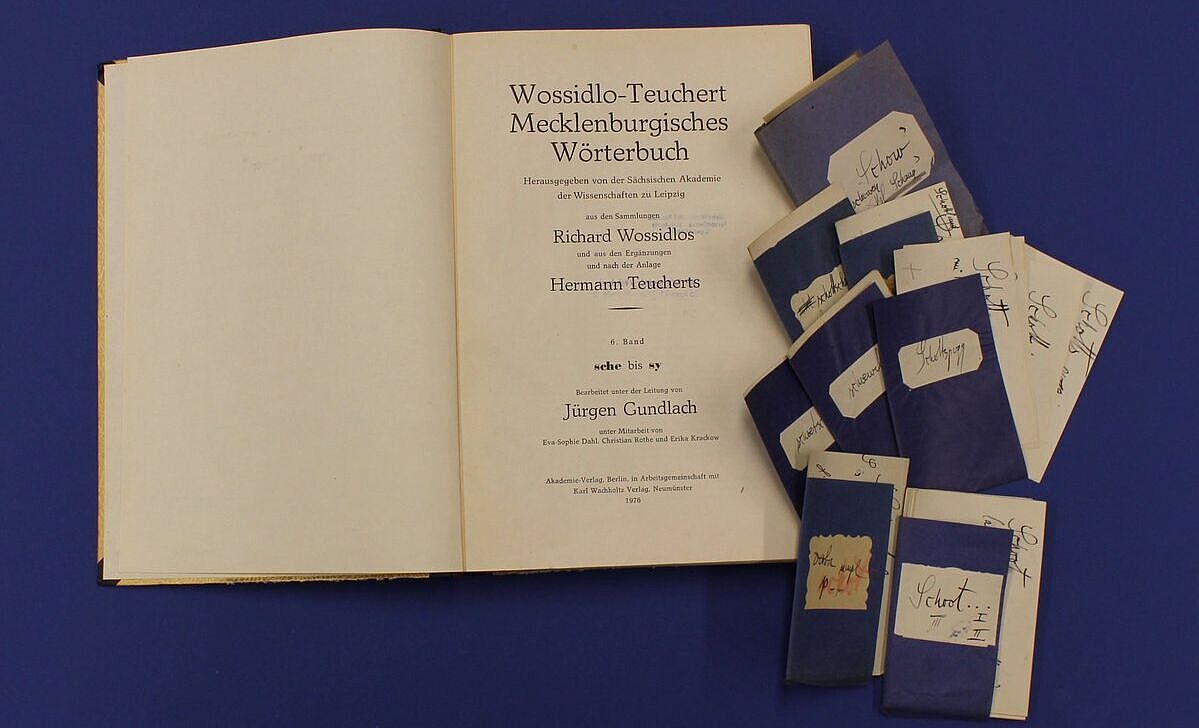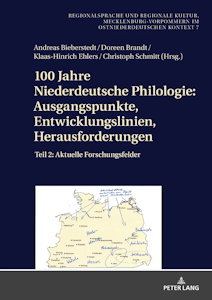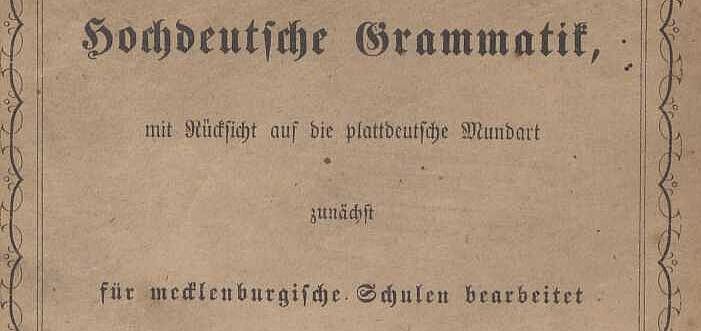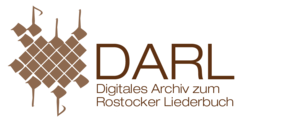Digital Low German Atlas for Mecklenburg-Western Pomerania (DiNA-MV)
The ‘Digital Low German Atlas for Mecklenburg-Western Pomerania (DiNA-MV)’ (Digitaler Niederdeutsch-Atlas für Mecklenburg-Vorpommern) comprises dialect maps that present the central dialectal characteristics of the Mecklenburg-Western Pomeranian dialects for a dense network of locations and several speakers per location. The focus is thus on the diversity of the language with regard to, for example, the gender and generation of the people in Mecklenburg-Vorpommern, but also with a view to the dynamics in the context of urbanity and rural areas. To this end, language recordings from 20th century surveys and from the recent research projects ‘Sprachvariation in Norddeutschland (SiN)’ and ‘Regionalsprache.de (REDE)’ are processed and analysed.
The digitally published, interactive atlas presents the results supplemented by audio samples and map commentaries, which enable low-threshold access and an intuitive impression of the regional language. At the same time, the atlas records the situational and intergenerationally observed language variation and thus documents the stability and change in the dialects of the federal state. The atlas is published in the technical environment of the ‘Regionalsprache.de (REDE)’ project.
"Wossidlo-Teuchert" online
The Mecklenburg Dictionary (MeckWb) represents the most important access to the vocabulary of the Mecklenburg dialect and is one of the most comprehensive scientific dialect dictionaries. With the help of a new approach to digital lexicography, the linking of a dictionary with its folkloristic, agrarian and socio-historical source material from the Wossidlo Archive (WossiDiA) is to be realised digitally. This will make a central dialect dictionary digitally accessible for the Low German language area and, through subsequent integration into the dictionary network, enable comprehensive research for specialised scholars and the general public.
The MeckWb was integrated into the infrastructure of the Trier dictionary network and thus its networking with the dictionaries created there. In this way, nd. (and hd.) headwords of the MeckWb can also be found and compared within the framework of superordinate searches across several dictionaries and lexicological, dialectological, linguistic-historical, comparative, but also ethnological questions can be pursued. At the same time, the future network would be the first time in German-language dialect lexicography that one of the three major dialectal associations (Low German, Middle German, Upper German) would be documented lexically in its entirety.
The Mecklenburg Dictionary went online on 7 April 2025 and can be accessed at
www.wossidlo-teuchert.online
www.wossidlo-teuchert.de
www.woerterbuchnetz.de/MeckWB
Regional Language and Regional Culture
Mecklenburg-Western Pomerania in the East Low German Context
The publication series ‘Regional Language and Regional Culture. Mecklenburg-Vorpommern im ostniederdeutschen Kontext’ edited by Priv.-Doz. Dr Birte Arendt (University of Greifswald),
Prof. Dr Andreas Bieberstedt (University of Rostock), Prof. Dr Doreen Brandt (University of Oldenburg) and Priv.-Doz. Dr Klaas-Hinrich Ehlers (University of Rostock) deals with linguistic, historical and didactic research questions in the context of Mecklenburg-Vorpommern. Seven volumes have now been published (as of 2024), three of which are available as open access.
‘The aim of the series is to unite work on language and communication in Mecklenburg-Vorpommern under one publishing umbrella and to bring together the previously disparate research in this field for the first time and in the long term. Linguistic research into the language(s) in Mecklenburg-Vorpommern has a tradition dating back to the 19th century (and beyond), with a long focus on the historical Middle Low German language forms and the basic dialectal varieties, i.e. the traditional Mecklenburg and Pomeranian dialects. In the context of more recent dialectology and regional language research, an increased scientific interest in the recent regional language can also be observed in recent years, whose structuring, differentiation, development and use is being analysed.’ - Peter Lang
Mecklenburgsches High German, Regional High German, Missingsch - Structure, dynamics and status of the regional colloquial language of Mecklenburg in the 19th century. A corpus-based study.
The aim of the project is to empirically describe the historical colloquial language of Mecklenburg on the basis of a comprehensive, in part novel database. The focus is on the structure and dynamics of this historical region around the middle of the 19th century, with a diachronic perspective being added to the research focus by looking at the subsequent 20th century and the preceding turn from the 18th to the 19th century. To this end, a corpus of literary and language didactic texts from the 19th and late 18th centuries was compiled. The diatopic perspective on the 20th century and the beginning of the 21st century is achieved by analysing the relevant research literature, including the information in Dahl (1974), Kehrein (2012), Ehlers (2018/2022) and the first volume of the ‘Nordeutscher Sprachatlas’.
The Digital Archive of the ‘Rostock Songbook’ (DARL)
The ‘Digital Archive of the Rostock Songbook’ (DARL) (Das Digitale Archiv zum 'Rostocker Liederbuch') is a joint project between the Institute of German Studies, the Institute of Computer Science, the University Library and the IT and Media Centre of the University of Rostock as well as the Rostock University of Music and Theatre. The project is managed by Prof Dr Franz-Josef Holznagel from the Institute of German Studies; the DARL was funded by the Mecklenburg-Vorpommern Research Fund between March 2012 and November 2013. The digital archive is intended as a further development of the previous website, which was located under the domain www.rostocker-liederbuch.de, and as a supplement to the edition of the songs and melodies of the ‘Rostocker Liederbuch’.

